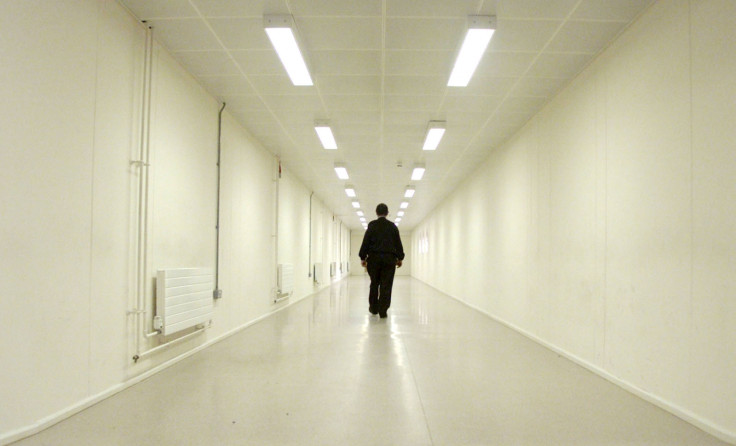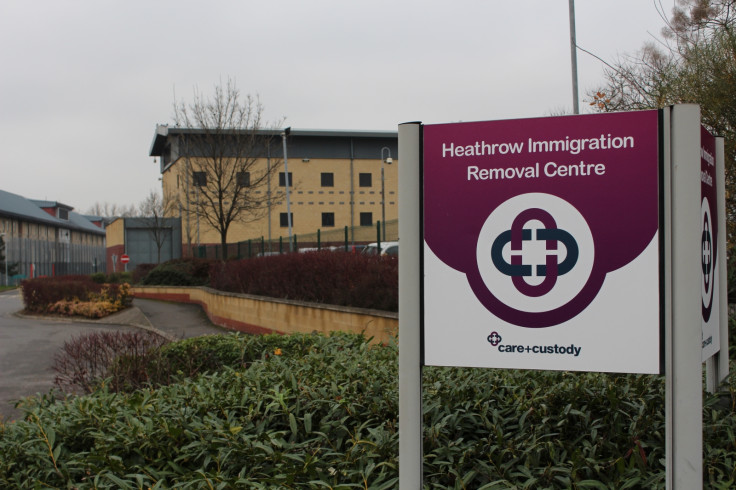'They will get you': Britain's refugee detention centres are no go areas for journalists
The Home Office outsources its migrant prisons to private companies.

Exit Heathrow Terminal 3 and it is only a ten minute bus ride to the Harmondsworth and Colnbrook Immigration Detention Centres. But when you arrive at these institutions – funded by taxpayers but outsourced to private companies – they are far from welcoming.
I announce that I'm a journalist and the receptionist looks worried. He says I have to get permission from the Home Office. As I am getting ready to leave, I'm approached by another security guard who tells me I can't take photos on the site. "You can take photos from over there," he says, pointing to a lamppost some distance away.
I ask if I can just walk in between the two centres, the biggest in the UK, but that is forbidden too: "They will come and get you," he says. On the imposing metal gates hangs a sign: "No Trespassing". In the skies above, the sound of planes landing at Heathrow is constant.
This lockdown approach has always been a hallmark of immigration removal centres, known as IRCs. "The IRCs are opaque, cut off, and often physically remote," said Clare Sambrook, the founder of End Child Detention Now. "This increases difficulties relating to vulnerability and language. The only way to channel information out is through volunteer and campaign organisations."
Outsourcing has also helped evade a clear chain of command. "It's a fact that outsourcing makes it harder for people detained, their advocates, inspectorates, ombudsmen, and journalists to hold a person or agency to account," said Sambrook.
Britain's immigration detention infrastructure is amongst the largest in Europe. From 2009 to 2015, between 2,500 and 3,500 migrants have been in detention at any given time at an estimated average cost of £91 per day. There are 11 IRCs in the UK, in locations as diverse as Belfast and Weymouth, and nine of them are privately run. Companies involved include Mitie, G4S, Serco, GEO, Reliance Secure Task Management, and Global Solutions.
"They're not at all transparent unfortunately," says Tom Sanderson, a journalist at the Centre for Investigative Journalism in London. "It's easier with this system to drive down costs by providing a progressively worse service, without direct responsibility for the impact of that poor service."
Many NGO reports, by groups such as Medical Justice or Corporate Watch, on deaths in detention, mental health issues in detention, pregnant women in detention, document a worsening services. The lack of transparency for contracts being paid for by taxpayers has started many calling for the ability to submit Freedom of Information Act requests to companies for projects using public funds.

The detention system is making a lot of money for the companies involved, but critics say that the human misery caused by it is wholly avoidable. Home Office figures show that half of those that are released from detention centres having been granted leave to remain or asylum should never have been locked up anyway, Sanderson says.
Human rights groups try to keep IRCs transparent, but are often hampered by the fact that they are run by private companies rather than the Home Office directly.
I feel intimidated, pushed into the corned. I feel watched.
"We are constantly blocked from obtaining information even about simple matters such as how many pregnant women are detained in Yarl's Wood or the numbers of female staff at Yarl's Wood," says Natasha Walter, director of Women for Refugee Women (WRW). "The lack of transparency is extremely concerning. We would ask, what do they have to hide?"
"It seems straightforward logic that if private companies are doing the work of the Home Office and being paid out of tax receipts, then they should be liable to the same scrutiny as the public sector," says Walter.
Just outside the city of Bedford, Yarl's Wood is home to 410 detainees, mostly women and families, it has entered mainstream consciousness in a very real way, becoming to site of regular protests and scandals. The main operation is run by Serco, with G4S responsible for healthcare and Tascor doing the escorting and transportation.
When visiting you are not allowed to take anything in to meet the detainees apart from a pen and a notebook – and you don't mention you are a journalist. An official request to Serco for a tour of Yarl's Wood, garnered this reply: "The Home Office [...] make all decisions about visits to the Centre. You should therefore approach the Home Office press office to request such a visit. I think it is pretty unlikely that they will agree to one as they have not allowed any journalists access up until now."
The Home Office did not reply to my request to visit Yarl's Wood.
And I am not alone, the UN special rapporteur was denied the ability to go inside by Theresa May when she was Home Secretary. Diane Abbott, Labour's Shadow Home Secretary, has had repeated requests for a visit turned down.
Mabel Gawanas, a Namibian immigrant, is nearing three years detention without charge in Yarl's Wood, the longest period of detention in the institution's history. She speculates as to why neither Serco nor the Home Office want journalists inside.
"I don't think many people know what happens in the IRC. All IT is monitored, and many sites [are] banned, like Youtube. To log in to computers you have to put in personal password, that is new. I cannot read or write about myself, my case, they stopped that. They give us [a] phone, but they take the code, they can listen."
She continues: "I feel intimidated, pushed into the corned. I feel watched. We know they are listening to our phones. We feel they look at our emails as well. I feel spied upon, that's what made me depressed last week. I don't want it any more. We don't have freedom, they try to stop us from speaking. That's why I was depressed. There is this control over everything we do."
Mabel has not been charged with any crime in relation to her detention. But she waits. And waits.
This panopticon feeling, where your every movement and every word is assumed to be monitored, has an effect. "People are scared of speaking out," Mabel says. "It's very hard to get a petition going, some girls are scared to talk about anything." There is no accountability for them either. "I feel there should be a place you can complain about Serco," she says. "The Home Office are no better, they were hacking our medical reports. We are nothing, we feel abandoned. We are treated like cattle in a camp."
A Home Office spokesperson told IBTimes UK: "Detention is an important tool that helps us remove those with no right to be in the country and it is vital that this is carried out with dignity and respect. We take the welfare of our detainees very seriously. All detainees have reasonable and regulated access to the internet and IT facilities and it is completely wrong to say that the Home Office "hacks" into medical records. All access to confidential medical information is subject to strict control under the Data Protection Act."
Serco did not want to comment for the article, telling IBTimes UK that the questions should be directed to the Home Office.
But it is clear there is a reason taxpayer-funded IRCs, and the profits they produce for private corporations, are kept aware from the glare of public scrutiny. How long that situation remains tenable, however, is another question.
Travel funding for this story was provided by the Pulitzer Center on Crisis Reporting
© Copyright IBTimes 2025. All rights reserved.






















